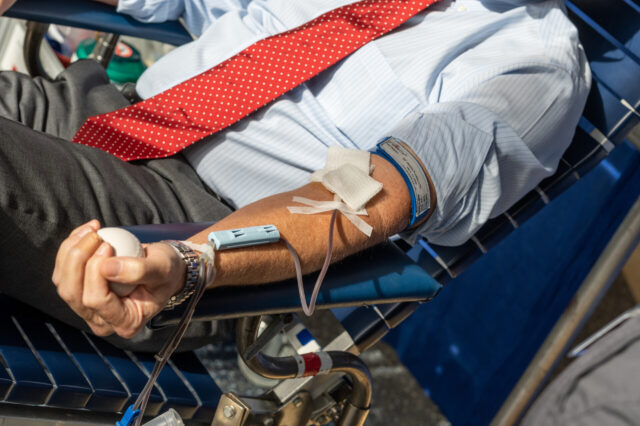COVID-19 highlights need for blood donations

As the coronavirus COVID-19 pandemic continues to escalate, experts are warning of a dire shortage of blood as donors stay home and blood drives across the country are canceled.
People should continue to donate blood while taking appropriate precautions and following guidelines from the Centers for Disease Control and Prevention about social distancing and hand washing, said Bruce Spiess, M.D., FAHA, a professor of anesthesiology and associate chair of research in the UF College of Medicine’s department of anesthesiology.
People cannot contract the virus from donating blood, he explained. The risk would come from potentially coming into contact with people who have been exposed.
“It’s an individual decision,” said Spiess, a national expert in blood management who runs the Patient Blood Management program at UF Health. “We have a national blood shortage, and it helps for everyone to donate blood. It will only get worse if everyone avoids donating.”
Last week, U.S. Surgeon General Jerome Adams, M.D., M.P.H., an anesthesiologist, also urged everyone to consider donating blood.
According to the American Red Cross, about 7,000 Red Cross blood drives have been canceled across the United States since March 1, resulting in more than 200,000 fewer blood donations, with cancellations only increasing.
The crisis also highlights the need for action to expand the availability of oxygen therapeutics, or blood substitutes, such as Hemopure, Spiess said.
UF Health is the only institution in the country that has a compassionate-use license from the FDA for the use of Hemopure, a bovine hemoglobin product that works as a “bridge” by delivering oxygen while the body regenerates its own blood. The license means it can be used when there are no other options available in patients who qualify.
As of Tuesday, the blood supply in the Gainesville region was stable thanks to the surgeon general’s plea, said Laura Bialeck, community development coordinator for the local branch of LifeSouth.
Before that, the shortage was “dire,” she said, with LifeSouth canceling about 100 local blood drives as of March 23. With high schools and businesses shut down, “It’s been a scramble to try to find places to go,” Bialeck said.
Blood centers are considered essential operations and anyone seeking to donate blood is exempt from the shelter-in-place regulation in effect in Alachua County.
People seeking to donate platelets, which have a short shelf life of only five days, should call to make an appointment at a LifeSouth center because officials want to ensure they have a steady supply. At the four LifeSouth blood mobiles in the region where only whole blood donations are being accepted currently, LifeSouth is limiting the number of people who can come in but people can wait in their cars to reduce contact and be texted to go in.
About the author
